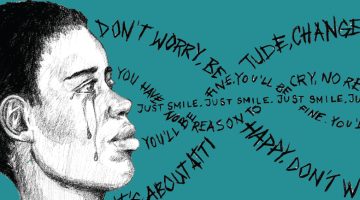By Joey Thyne

Photo Courtesy of Wikipedia.org
“Nothing really matters when the one you love is gone,” Nick Cave sings in the song “I Need You.” A recurring topic throughout his new album is loss. Similar to last year’s “Carrie & Lowell” by Sufjan Stevens, “Skeleton Tree” expresses the agony of grief.
Cave’s son died a year ago after falling off a cliff. Much of the album was recorded prior to his son’s passing, but content was edited and added afterward. Regardless, death is an unavoidable presence on the album.
To use a cliche, Nick Cave & the Bad Seeds needs no introduction. The post-punk group has consistently been releasing music since 1983. However, no previous album has been quite as candid.
On the album opener “Jesus Alone,” Cave gets straight to the point. The first line is “You fell from the sky / Crash landed in a field near the river Adur.” This song continues with eerie keyboards and growling guitars.
From this point on, Cave more or less relinquishes his goth persona. The “prince of darkness” melts away and he bears his soul.
The instrumentation is stripped down. Most of it is based around delicate piano, hollow acoustic guitar, and ominous synths or string arrangements. Even the album layout is minimalistic with a brief eight-song track list and mostly black cover.
Nick Cave is older now, his voice not what it used to be. Many times singing is replaced by spoken-word poetry. When he does sing, his withered voice adds to the effect of desperation.
The emotion exhibited on the album is never manipulative or overly sentimental, but instead acknowledges the disorienting conflict that goes along with the death of a loved one. As always, his lyrics are jam-packed with abstract metaphors and cryptic visions. “And in the mirror I see me vomit in the sink / And all through the house we hear the hyenas hymn,” he speaks on “Magneto.” “The jittery TV /glowing white like fire,” he sings on “Skeleton Tree.”
Typical to those dealing with the death of a loved one, Nick Cave examines his own mortality and ponders existentialism. “There are powers at play more forceful than we / Come over here and say a short prayer / A prayer to the air, the air that we breathe,” he says on “Anthrocene.” “They told us our gods would outlive us / But they lied,” he says on “Distant Sky.”
It’s important to mention that the entire album isn’t miserable. “Rings of Saturn” is pleasant to listen to, with its crackling atmosphere and relaxing piano. “Distant Sky” is an anomaly in the Nick Cave & the Bad Seeds catalog because of its vulnerable sincerity. The song is a divine revelation. Danish singer Else Torp delivers a lovely performance over the heartbreaking organ, telling the spirit of the deceased to move on, saying, “Let us go now, my darling companion / Set out for the distant sky.”
The title track is the final song, on which he reminds us that “Nothing is for free.” The album closes with hushed voices repeating “It’s all right now,” as if trying to convince themselves.
Similar to David Bowie’s “Blackstar” earlier this year, “Skeleton Tree” has so much emotional weight it is a tough album to judge. It is an album intended to be experienced alone in a dark room, washing over the listener.
Joey Thyne can be reached at bnelson@sagebrush.unr.edu or on Twitter @b_e_nelson.










